The Gut-Sugar Connection: Why This Meal Plan Works
Your gut microbiome—the trillions of bacteria in your digestive tract—thrives on diversity and balance. Unfortunately, added sugars feed harmful bacteria while starving beneficial ones. A 2021 study in Cell Metabolism found that participants who reduced added sugar intake for just two weeks showed significant improvements in microbiome diversity and reduced inflammation markers.
This meal plan works through three key mechanisms:
Eliminates Added Sugars
By removing all forms of added sugar, we stop feeding harmful bacteria that can cause dysbiosis (an imbalance in gut bacteria).

Provides Prebiotics
Rich in fiber-filled foods that act as prebiotics—fuel for your beneficial bacteria, helping them multiply and thrive.
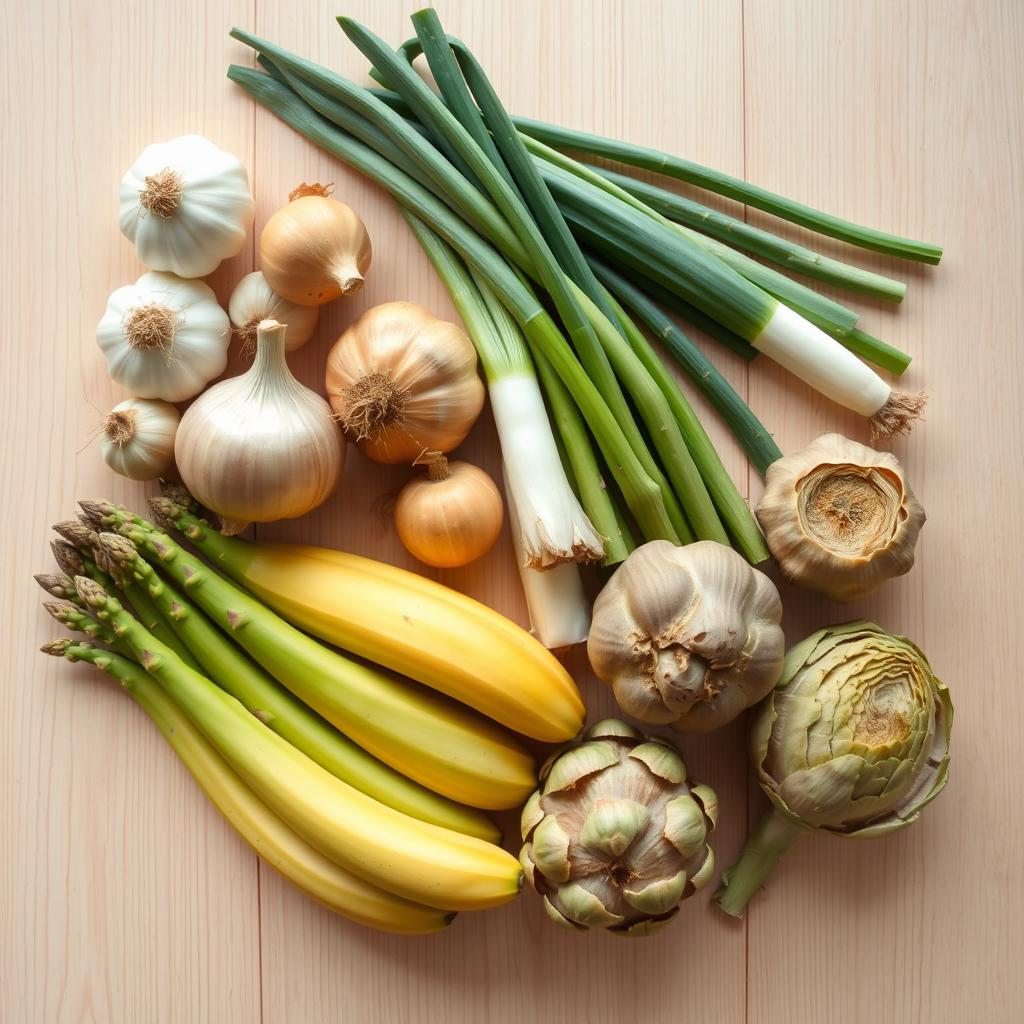
Includes Probiotics
Incorporates naturally fermented foods that introduce beneficial bacteria directly into your digestive system.
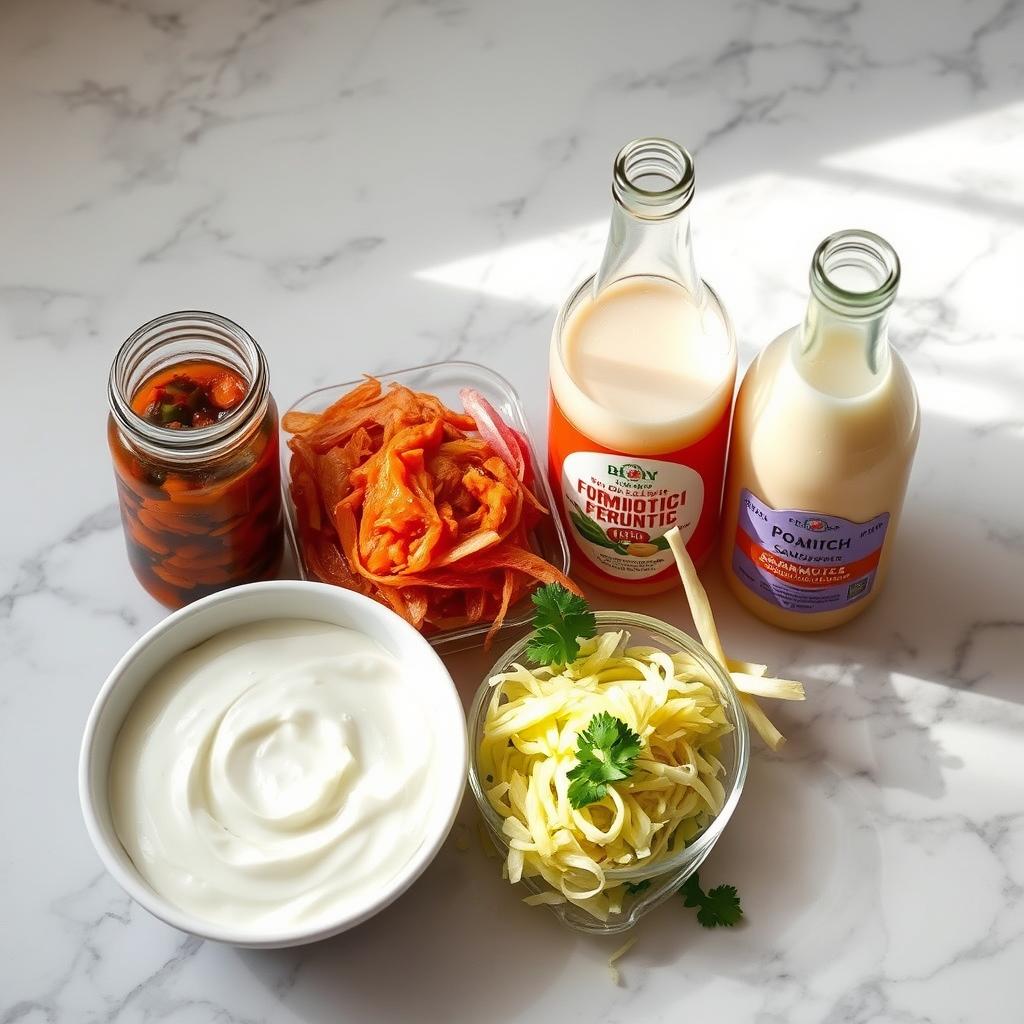
7-Day No-Sugar Meal Plan for Gut Health
Each day of this no-sugar meal plan provides at least 30 grams of fiber and 70 grams of protein to support gut health and promote satiety. We’ve carefully selected foods rich in prebiotics, probiotics, and polyphenols while altogether avoiding added sugars. The natural sweetness from fruits and vegetables will help satisfy cravings while nourishing your gut microbiome.
Day 1: Microbiome Reset
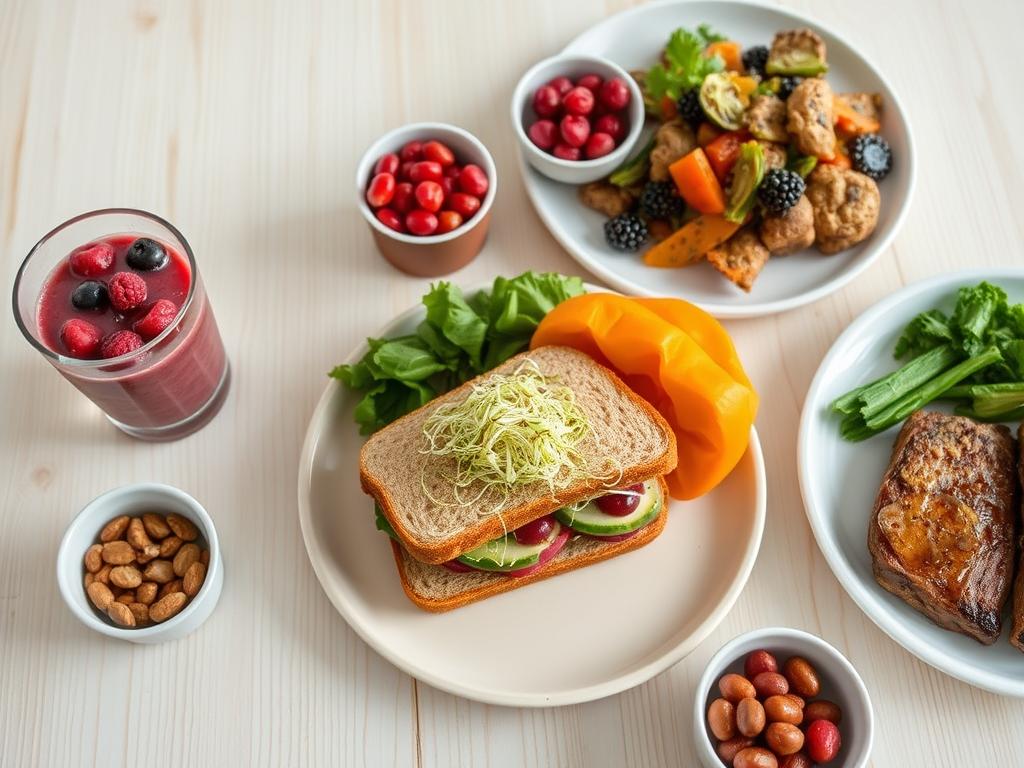
Breakfast (424 calories)
- Mixed-Berry Breakfast Smoothie (1 serving)
- Probiotic boost: 2 tablespoons unsweetened kefir
- Gut-friendly fiber: 1 tablespoon ground flaxseeds
Morning Snack (291 calories)
- 1 medium apple
- 2 tablespoons almond butter
Lunch (581 calories)
- Gut-Friendly Veggie Sandwich on sourdough bread
- Probiotic boost: Includes fermented pickles and sprouts
Afternoon Snack (101 calories)
- Edamame with Aleppo Pepper (1 serving)
Dinner (421 calories)
- Crispy Tempeh Steaks with Sun-Dried Tomato Cream Sauce
- Steamed asparagus
- Prebiotic boost: Roasted Jerusalem artichokes
Daily totals: 1,818 calories, 73g protein, 46g fiber, 0g added sugar
Gut health focus: The fermented tempeh and sourdough provide probiotics, while flaxseeds and Jerusalem artichokes feed beneficial bacteria.
Day 2: Anti-Inflammatory Focus
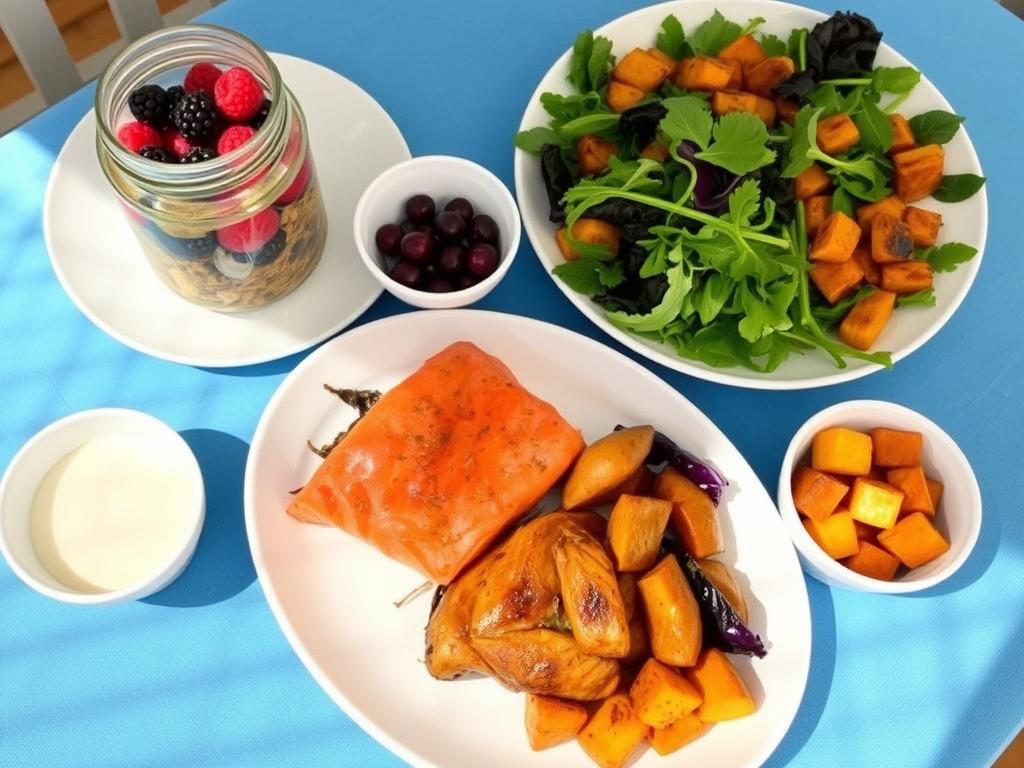
Breakfast (453 calories)
- 3-Ingredient Overnight Berry Muesli
- 1 medium banana
- 1 tablespoon almond butter
Morning Snack (270 calories)
- 1 cup plain Greek yogurt
- 1 medium peach
- 1 tablespoon pistachios
Lunch (405 calories)
- Superfood Chopped Salad with Salmon & Creamy Garlic Dressing
- Anti-inflammatory boost: Includes omega-3 rich salmon and turmeric in dressing
Afternoon Snack (162 calories)
- Mediterranean Bean Dip with cucumber slices
Dinner (502 calories)
- Sheet-Pan Chicken Thighs with Red Cabbage & Sweet Potatoes
- Prebiotic boost: Red cabbage contains inulin fiber
Daily totals: 1,792 calories, 107g protein, 32g fiber, 0g added sugar
Gut health focus: Red cabbage is rich in anthocyanins that reduce gut inflammation, while Greek yogurt provides beneficial bacteria.
Day 3: Fiber Diversity Day
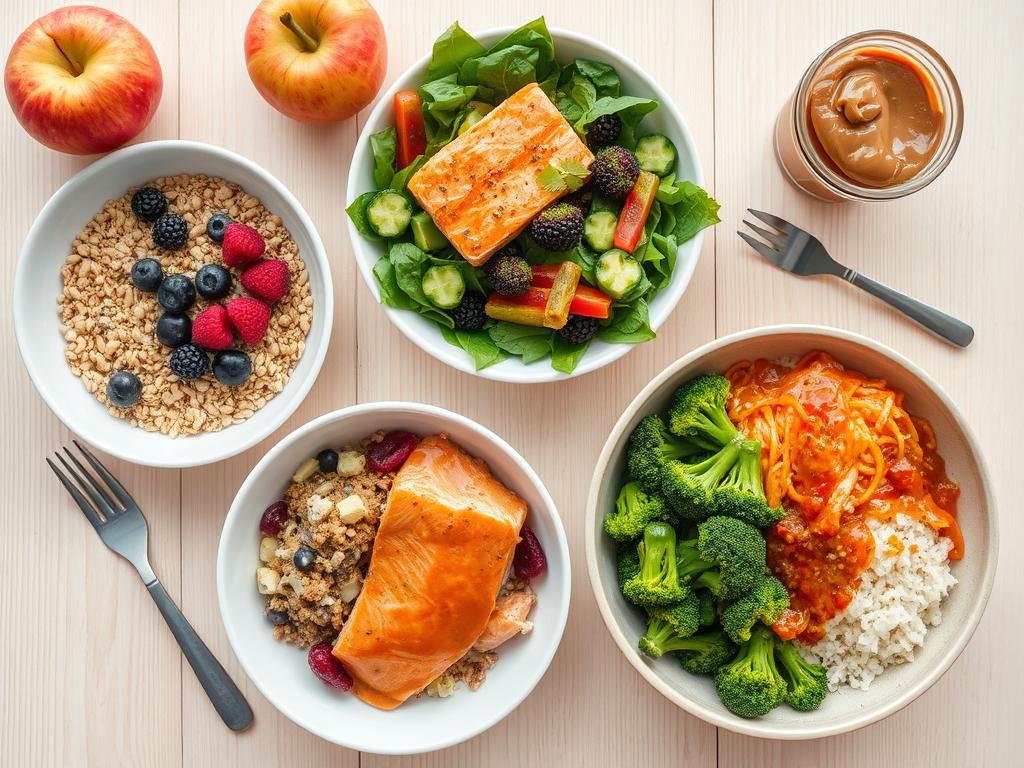
Breakfast (301 calories)
- 3-Ingredient Overnight Berry Muesli
- 1 tablespoon chia seeds (mixed into muesli)
Morning Snack (291 calories)
- 1 medium apple
- 2 tablespoons almond butter
Lunch (405 calories)
- Superfood Chopped Salad with Salmon & Creamy Garlic Dressing
- Fiber diversity: Contains 8+ different plant foods
Afternoon Snack (162 calories)
- Mediterranean Bean Dip with carrot sticks
Dinner (639 calories)
- Roasted Broccoli & Kimchi Rice Bowl
- Probiotic powerhouse: Kimchi contains multiple strains of beneficial bacteria
Daily totals: 1,798 calories, 81g protein, 39g fiber, 0g added sugar
Gut health focus: This day features 15+ different plant foods to maximize microbiome diversity.
Day 4: Digestive Support
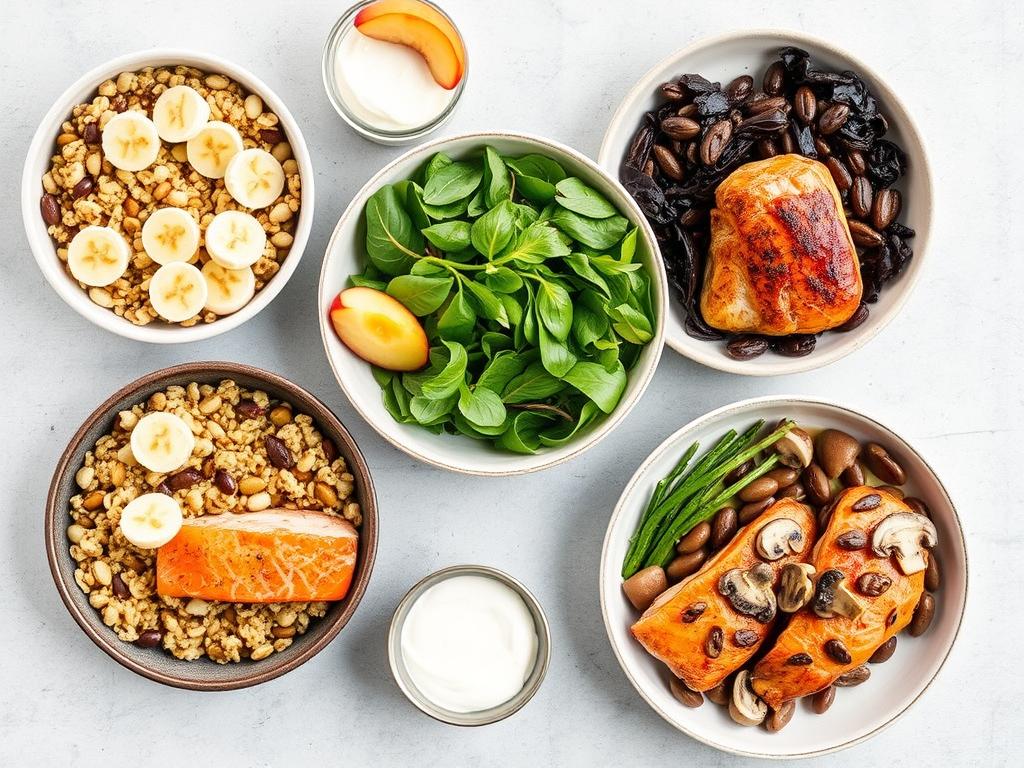
Breakfast (453 calories)
- 3-Ingredient Overnight Berry Muesli
- 1 medium banana
- 1 tablespoon almond butter
Morning Snack (224 calories)
- 1 cup plain Greek yogurt
- 1 medium peach
Lunch (405 calories)
- Superfood Chopped Salad with Salmon & Creamy Garlic Dressing
Afternoon Snack (162 calories)
- Mediterranean Bean Dip with bell pepper strips
Dinner (581 calories)
- Sheet-Pan Chicken with White Beans & Mushrooms
- Digestive support: Mushrooms contain beta-glucans that support gut barrier function
Daily totals: 1,825 calories, 111g protein, 32g fiber, 0g added sugar
Gut health focus: White beans provide resistant starch that feeds beneficial bacteria in the colon.
Day 5: Polyphenol Power
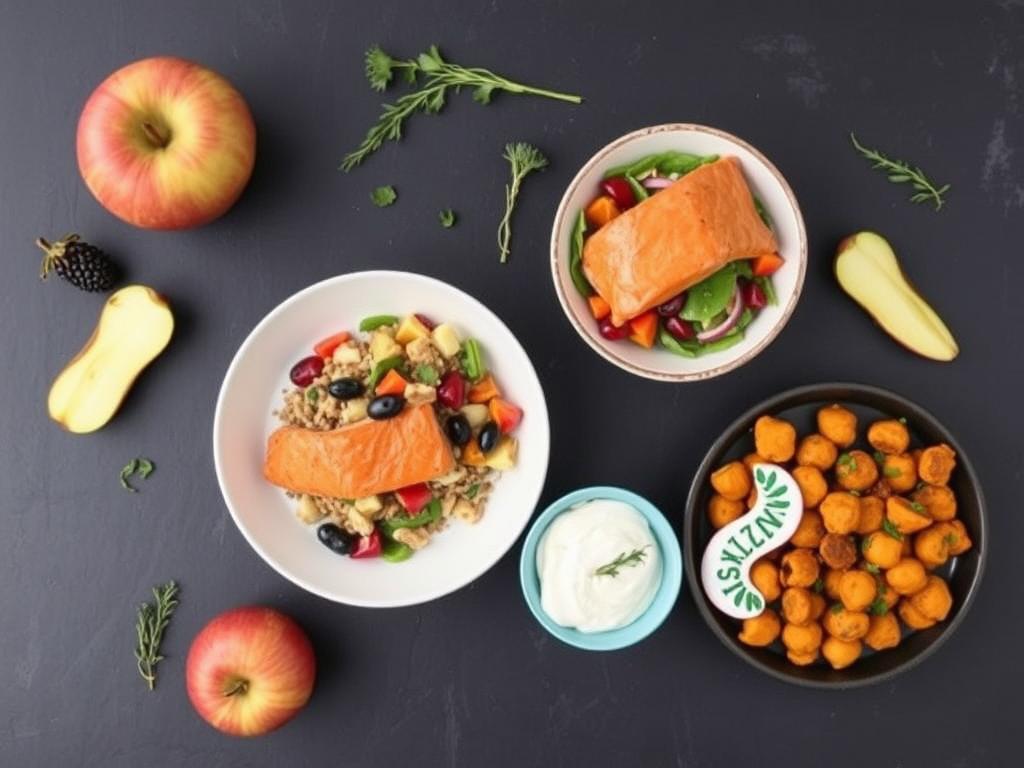
Breakfast (301 calories)
- 3-Ingredient Overnight Berry Muesli
- 1 tablespoon chia seeds (mixed into muesli)
Morning Snack (291 calories)
- 1 medium apple
- 2 tablespoons almond butter
Lunch (405 calories)
- Superfood Chopped Salad with Salmon & Creamy Garlic Dressing
Afternoon Snack (162 calories)
- Mediterranean Bean Dip with jicama sticks
Dinner (613 calories)
- Sheet-Pan Spiced Chickpeas & Sweet Potatoes with Herby Yogurt
- Polyphenol boost: Spice blend includes turmeric, cumin, and cinnamon
Daily totals: 1,772 calories, 77g protein, 43g fiber, 0g added sugar
Gut health focus: Polyphenol-rich spices act as prebiotics and have anti-inflammatory effects in the gut.
Day 6: Fermented Foods Focus
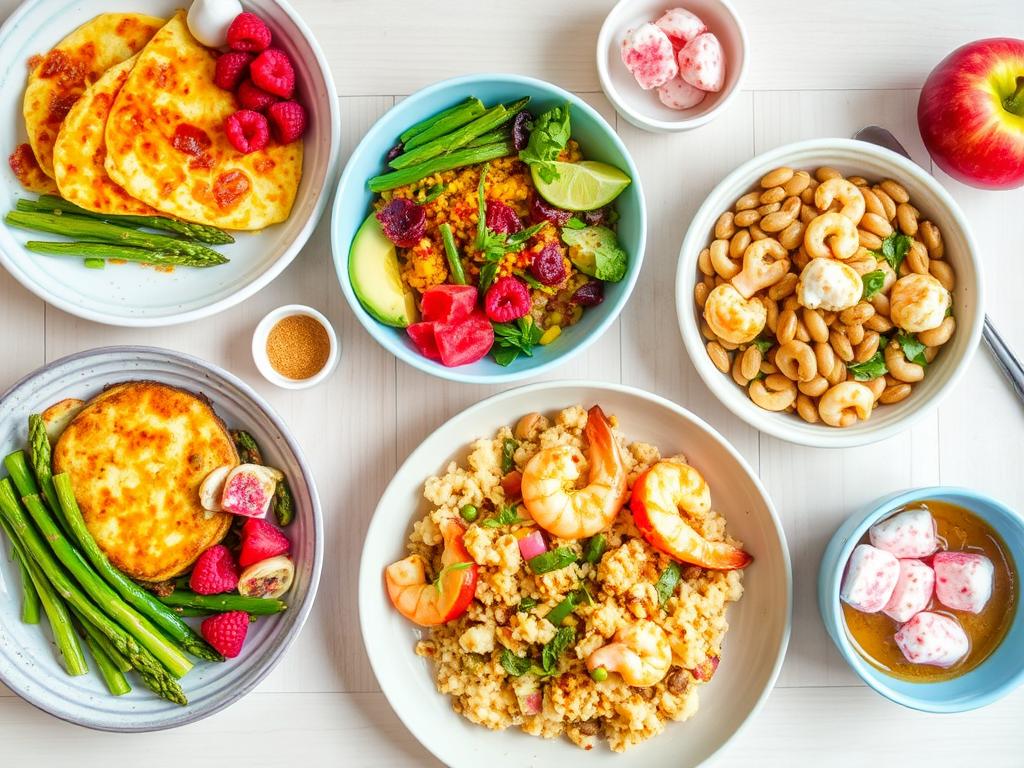
Breakfast (433 calories)
- Frittata with Asparagus, Leek & Ricotta
- 1 cup raspberries
Morning Snack (193 calories)
- 1 medium apple
- 1 tablespoon almond butter
Lunch (493 calories)
- Bean & Veggie Taco Bowl
- ¼ cup avocado slices
Afternoon Snack (246 calories)
- Lemon-Blueberry Frozen Yogurt Bites
Dinner (442 calories)
- Shrimp Cauliflower Fried Rice
- Gut-Healthy Miso Cup Soup (¾ cup)
- Fermentation focus: Miso is rich in beneficial bacteria
Daily totals: 1,807 calories, 91g protein, 43g fiber, 0g added sugar
Gut health focus: This day features multiple fermented foods introducing diverse probiotic strains.
Day 7: Omega-3 & Fiber Balance
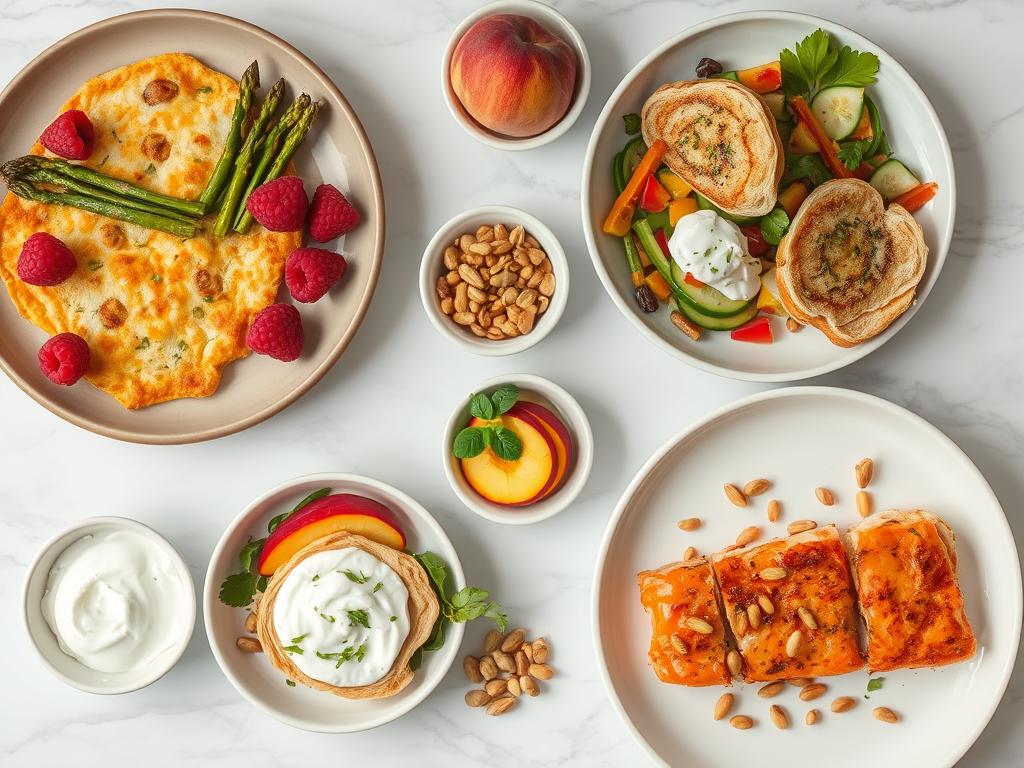
Breakfast (433 calories)
- Frittata with Asparagus, Leek & Ricotta
- 1 cup raspberries
Morning Snack (316 calories)
- 1 cup plain Greek yogurt
- 1 medium peach
- 2 tablespoons pistachios
Lunch (353 calories)
- Chicken & Cucumber Pita Sandwiches with Yogurt Sauce
Afternoon Snack (246 calories)
- Lemon-Blueberry Frozen Yogurt Bites
Dinner (422 calories)
- Sheet-Pan Roasted Salmon & Vegetables
- Omega-3 boost: Salmon is rich in anti-inflammatory fatty acids
Daily totals: 1,770 calories, 130g protein, 34g fiber, 0g added sugar
Gut health focus: Omega-3 fatty acids help reduce inflammation and support microbiome diversity.
Printable Shopping List
Use this comprehensive shopping list to prepare for your 7-day no-sugar gut health journey. We’ve organized everything by department to make your shopping trip efficient.
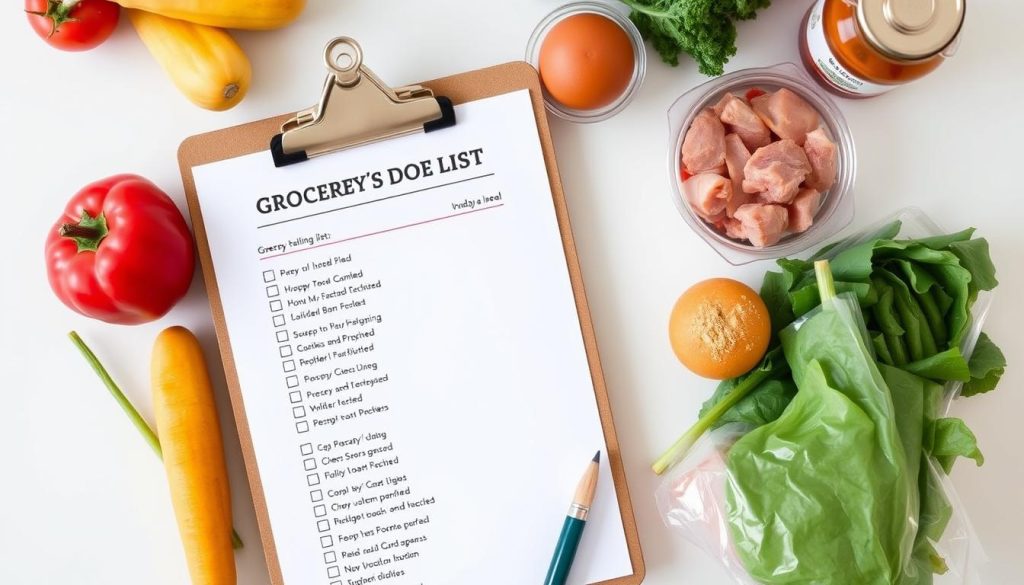
| Produce | Protein | Dairy & Alternatives | Pantry Items |
| □ Mixed berries (2 bags) □ Bananas (3) □ Apples (4) □ Peaches (3) □ Raspberries (2 cups) □ Lemons (2) □ Asparagus (2 bunches) □ Broccoli (1 large head) □ Red cabbage (1 head) □ Sweet potatoes (4) □ Jerusalem artichokes (1 lb) □ Leeks (2) □ Garlic (1 head) □ Ginger root (1 small piece) □ Cucumbers (3) □ Bell peppers (3 assorted colors) □ Carrots (1 bunch) □ Jicama (1 small) □ Avocado (1) □ Mixed greens (2 bags) □ Fresh herbs: parsley, dill, cilantro |
□ Salmon fillets (1 lb) □ Chicken thighs (2 lbs) □ Tempeh (8 oz) □ Shrimp (1 lb) □ Eggs (1 dozen) □ Edamame (frozen, 1 bag) □ White beans (2 cans) □ Chickpeas (2 cans) |
□ Plain Greek yogurt (32 oz) □ Kefir, plain (1 quart) □ Ricotta cheese (8 oz) □ Almond milk, unsweetened (1 quart) □ Coconut yogurt, unsweetened (8 oz) |
□ Rolled oats (1 container) □ Chia seeds (1 small bag) □ Flaxseeds, ground (1 small bag) □ Almond butter (1 jar) □ Pistachios (1 small bag) □ Brown rice (1 bag) □ Cauliflower rice (1 bag frozen) □ Sourdough bread (1 loaf) □ Whole grain pita (1 package) □ Kimchi (1 jar) □ Miso paste (1 small container) □ Olive oil □ Apple cider vinegar □ Dijon mustard □ Spices: turmeric, cumin, cinnamon, Aleppo pepper |
Dietitian Tips: Managing Sugar Cravings

Balance Your Blood Sugar
Prevent blood sugar crashes by including protein, healthy fat, and fiber at every meal. This combination slows digestion and provides steady energy, reducing the physiological trigger for sugar cravings.
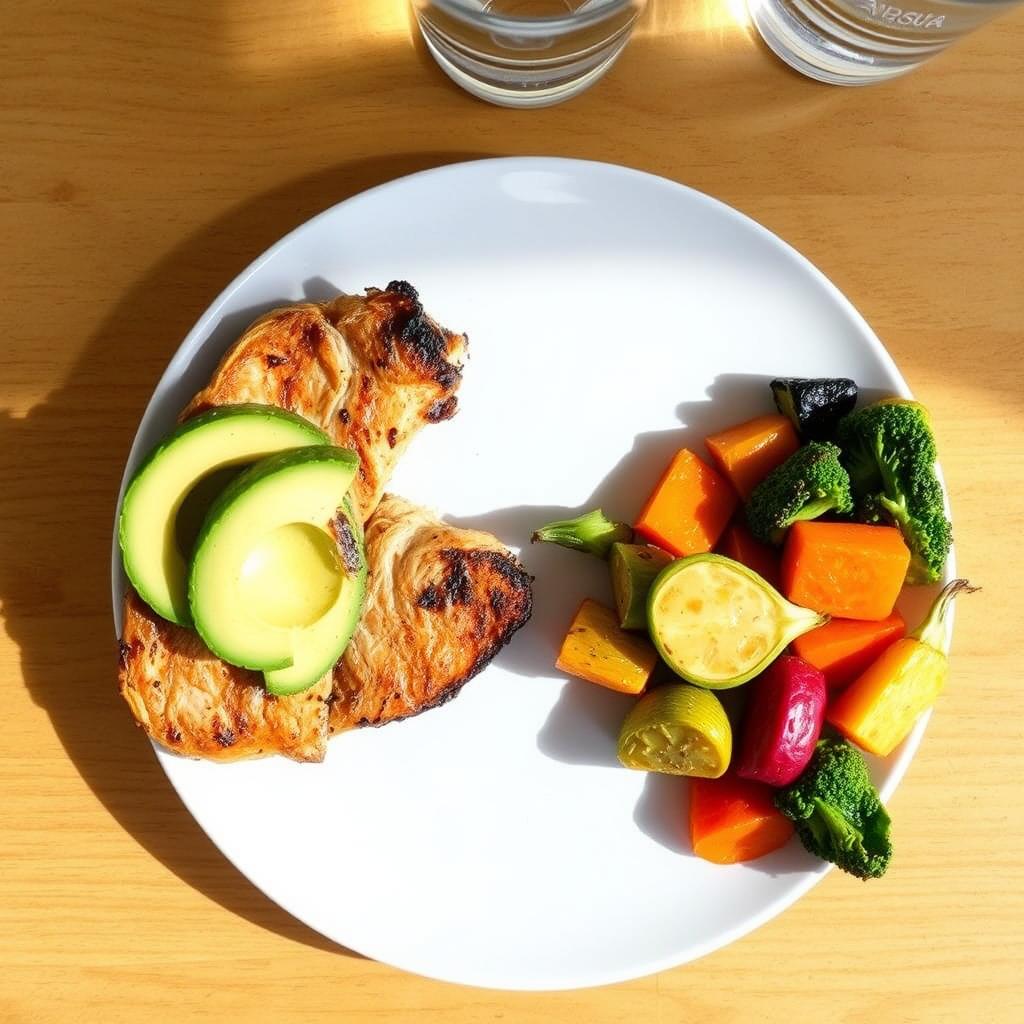
Leverage Fermented Foods
Research shows that regular consumption of fermented foods can actually reduce sugar cravings by altering taste preferences and improving gut bacteria balance. Aim for 1-2 servings daily.
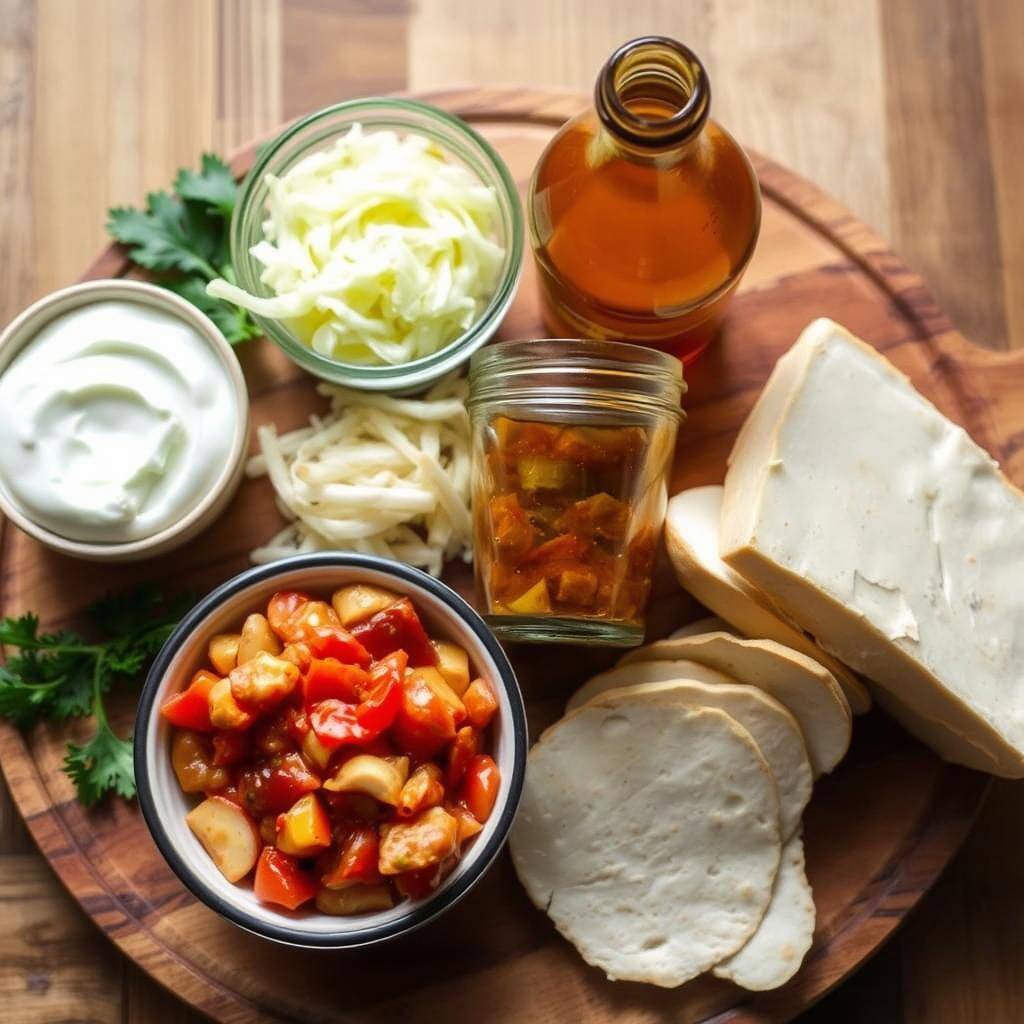
Use Flavor Enhancers
Cinnamon, vanilla extract, and spices can satisfy your taste for sweetness without added sugar. They also have the added benefit of supporting healthy blood sugar levels and reducing inflammation.
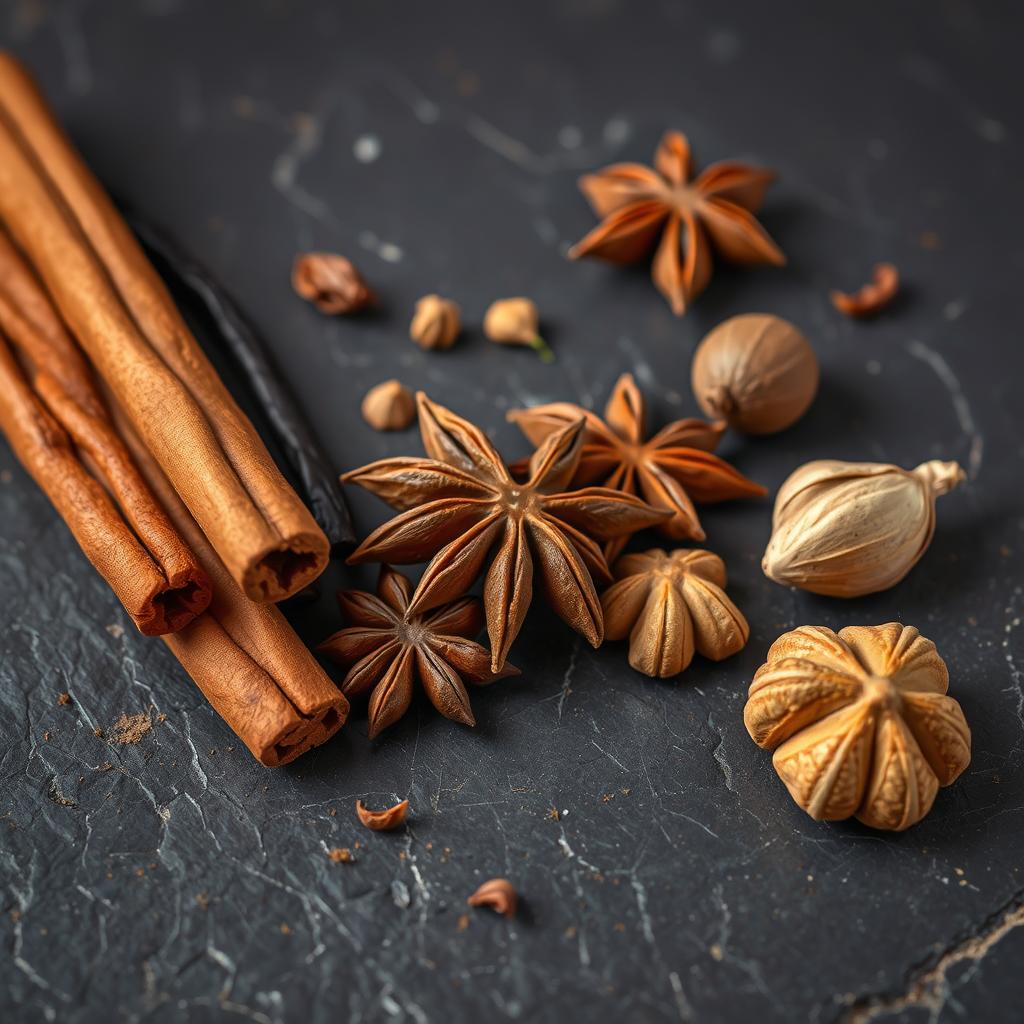
Natural Sugar-Free Recipes for Sweet Cravings
Cinnamon Almond Butter Energy Balls
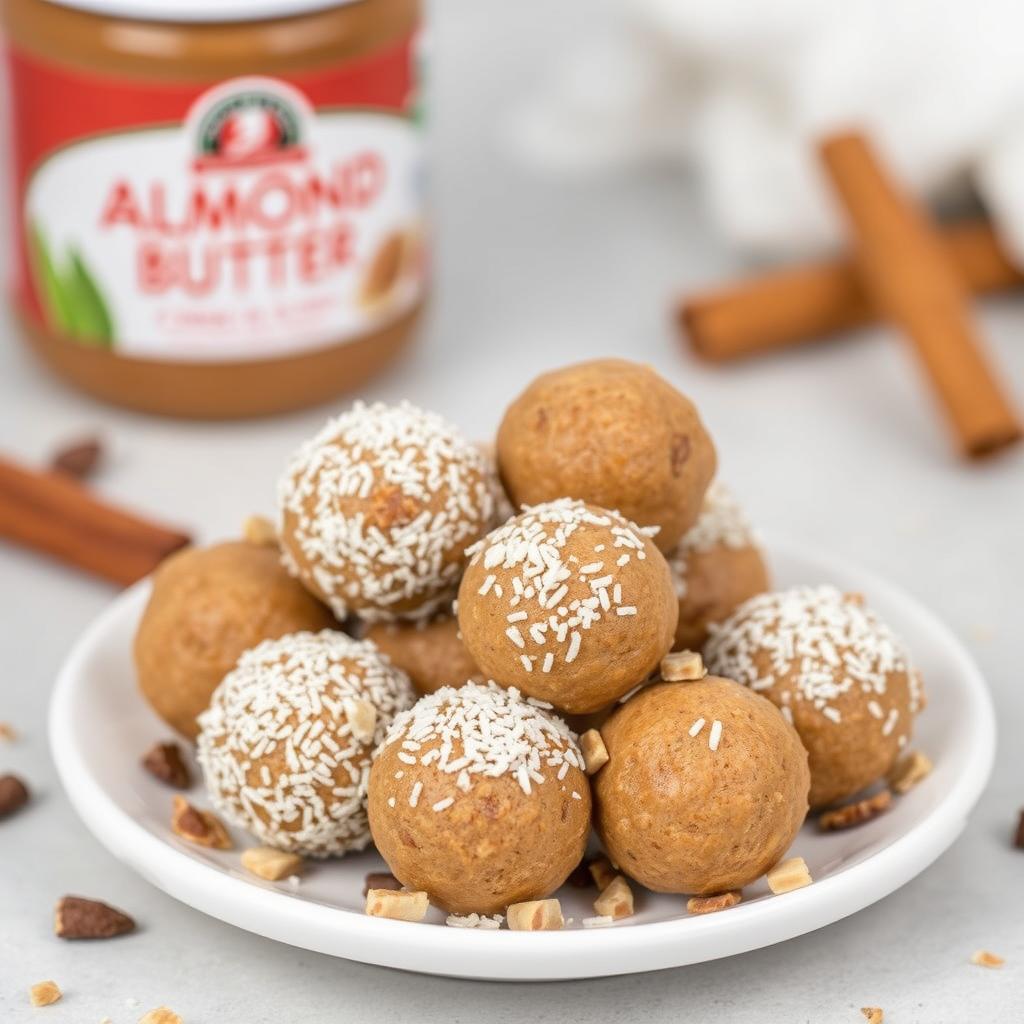
Ingredients:
- 1 cup almond butter
- 1 cup rolled oats
- 2 tablespoons ground flaxseed
- 1 teaspoon cinnamon
- 1 teaspoon vanilla extract
- Pinch of salt
Mix all ingredients, roll into 1-inch balls, and refrigerate for 30 minutes. Store in the refrigerator for up to one week.
Berry Chia Pudding
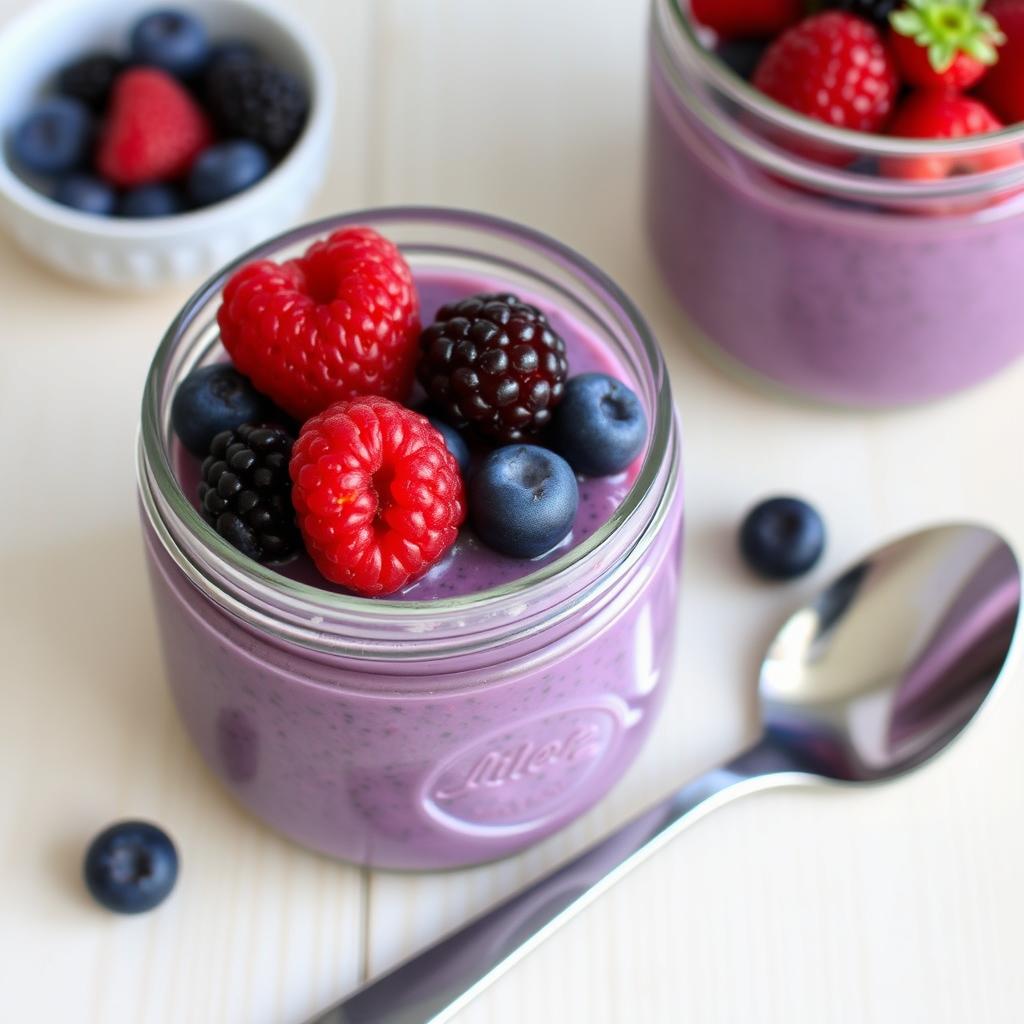
Ingredients:
- ¼ cup chia seeds
- 1 cup unsweetened almond milk
- ½ cup mixed berries
- ¼ teaspoon vanilla extract
- Pinch of cinnamon
Mix chia seeds and almond milk, let sit for 5 minutes, then stir again. Refrigerate for at least 2 hours. Blend berries and fold into the pudding. Top with fresh berries.
Coconut Yogurt Bark
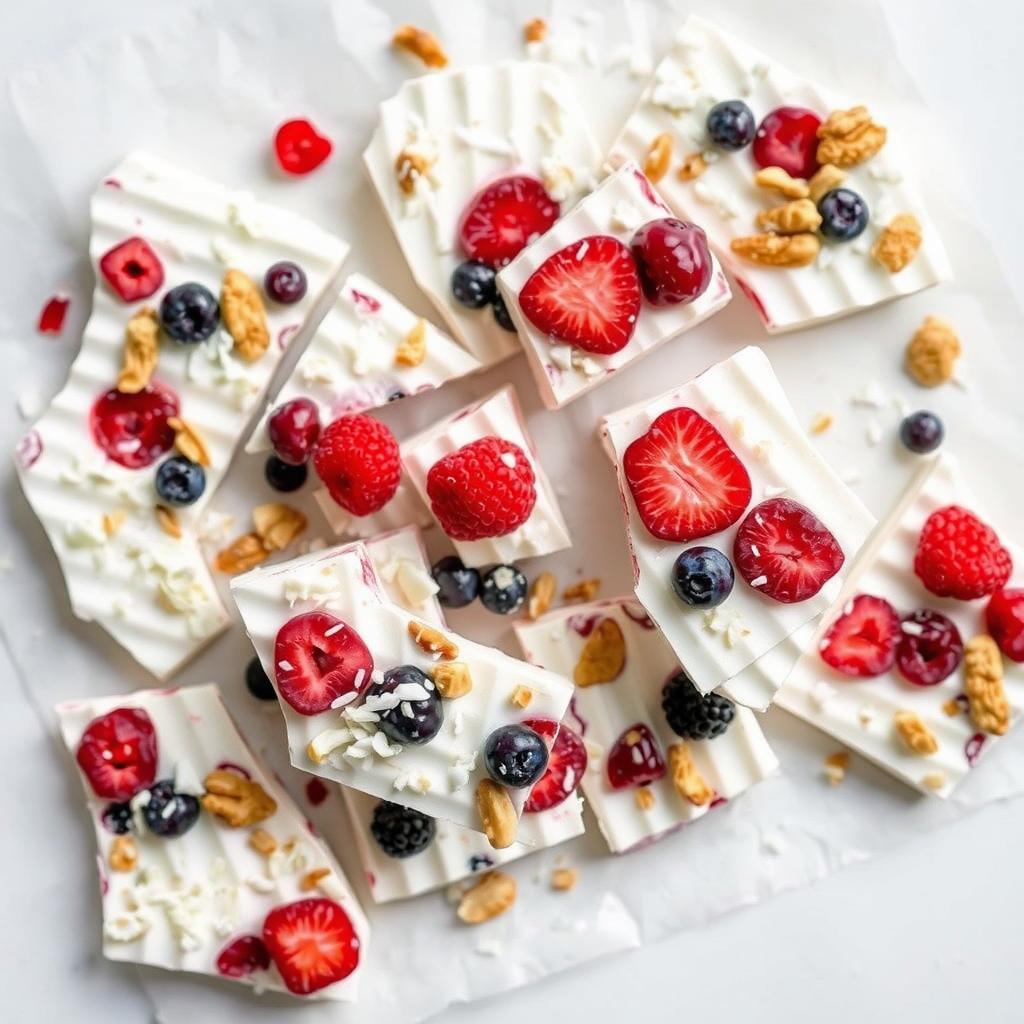
Ingredients:
- 2 cups plain Greek yogurt
- 1 teaspoon vanilla extract
- ½ cup mixed berries
- 2 tablespoons chopped pistachios
- 2 tablespoons unsweetened coconut flakes
Mix yogurt and vanilla, spread on a parchment-lined baking sheet. Top with berries, nuts, and coconut. Freeze for 3 hours, then break into pieces.
Understanding Prebiotics and Probiotics in This Meal Plan
This no-sugar meal plan strategically incorporates both prebiotics and probiotics to create a synbiotic effect—where beneficial bacteria are both introduced and properly nourished for maximum gut health benefits.
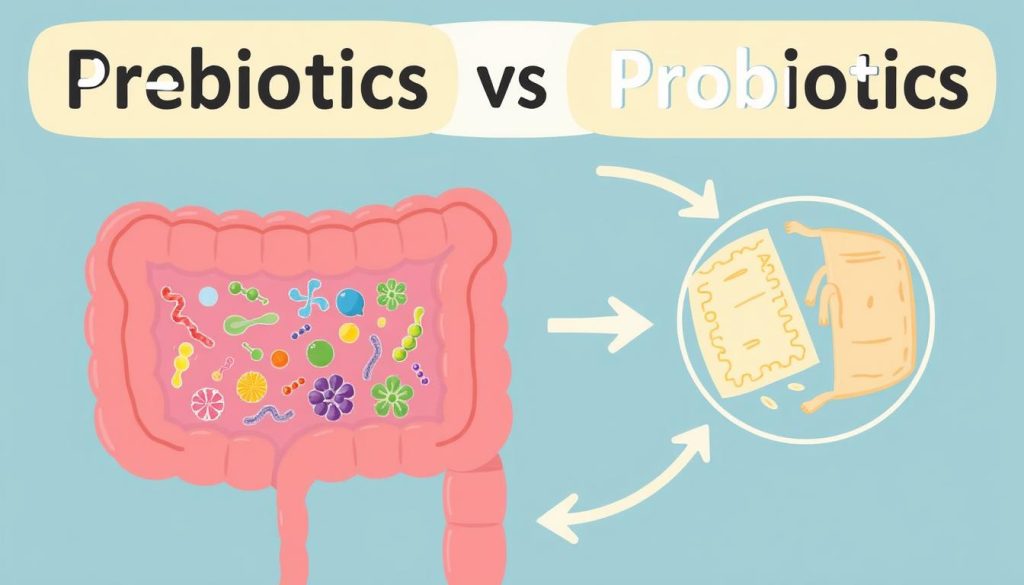
Prebiotics in Your Meal Plan
Prebiotics are specialized plant fibers that act as food for your beneficial gut bacteria. They pass undigested through your stomach and small intestine, then ferment in your colon to support healthy bacteria growth.
Key prebiotic sources in this plan:
- Jerusalem artichokes: Rich in inulin fiber (Day 1 dinner)
- Garlic and onions: Contain FOS (fructooligosaccharides) (Throughout recipes)
- Asparagus: Contains inulin and FOS (Day 1 and 6 meals)
- Bananas: Contain resistant starch and pectin (Day 2 and 4 breakfast)
- Oats: Contain beta-glucans (In muesli recipes)
- Flaxseeds: Rich in soluble fiber (Day 1 breakfast)
- Apples: Contain pectin (Multiple snacks)
Probiotics in Your Meal Plan
Probiotics are live beneficial bacteria that can provide health benefits when consumed in adequate amounts. They help restore and maintain a healthy balance of gut bacteria.
Key probiotic sources in this plan:
- Kimchi: Contains Lactobacillus bacteria (Day 3 dinner)
- Greek yogurt: Contains multiple strains including Lactobacillus bulgaricus (Multiple meals)
- Kefir: Contains up to 30 strains of beneficial bacteria (Day 1 breakfast)
- Miso: Contains Aspergillus oryzae (Day 6 dinner)
- Tempeh: Fermented soybeans with Rhizopus oligosporus (Day 1 dinner)
- Sourdough bread: Contains Lactobacillus bacteria (Day 1 lunch)
Frequently Asked Questions
Can I use honey or maple syrup on this no-sugar plan?
While honey and maple syrup are natural sweeteners, they still count as added sugars and can feed harmful gut bacteria. For this 7-day plan, we recommend avoiding all added sweeteners to maximize gut healing. If you absolutely need sweetness, a small amount of whole fruit or a few drops of liquid stevia (which doesn’t impact blood sugar) are better options.
Will I experience withdrawal symptoms when cutting out sugar?
Some people may experience temporary symptoms like headaches, fatigue, or irritability when first eliminating added sugars. These typically subside within 3-5 days as your body adjusts. The high protein and fiber content of this meal plan helps minimize these effects by keeping blood sugar stable. Stay well-hydrated and ensure you’re eating enough calories to further reduce withdrawal symptoms.
Is fruit allowed on a no-sugar diet?
Yes, whole fruits are included in this meal plan. While fruits contain natural sugars, they also provide fiber, vitamins, minerals, and antioxidants that support gut health. The fiber in whole fruit slows sugar absorption and feeds beneficial gut bacteria. We’ve carefully balanced fruit portions to provide sweetness without overloading your system with fructose.
How long should I follow a no-sugar diet for gut health benefits?
This 7-day plan can provide initial benefits, but research suggests that more significant microbiome changes occur after 2-3 weeks of consistent dietary changes. Many people notice improved digestion, energy, and reduced cravings within the first week. For chronic gut issues, a longer-term approach of 4-12 weeks may be beneficial, ideally under the guidance of a healthcare provider.
Can I modify this plan if I have food allergies or intolerances?
Absolutely. This plan can be adapted for various dietary needs while maintaining its gut-healing properties. For dairy allergies, substitute coconut yogurt for Greek yogurt. For gluten sensitivity, ensure your oats are certified gluten-free and use gluten-free bread alternatives. For nut allergies, substitute sunflower seed butter for almond butter. The key is maintaining the balance of prebiotics, probiotics, and avoiding added sugars.
Long-Term Benefits of a No-Sugar Approach for Gut Health
Committing to reducing added sugars in your diet can lead to profound improvements in your gut microbiome and overall health. Research published in the journal Gut shows that participants who maintained a low-sugar diet for 6 months experienced significant increases in beneficial bacterial diversity and reductions in inflammatory markers.
Beyond gut health, participants in long-term studies report improvements in energy levels, mood stability, skin clarity, and reduced frequency of digestive symptoms like bloating and irregular bowel movements. Many also experience a natural recalibration of their taste preferences, finding excessive sweetness unappealing after adapting to a lower-sugar lifestyle.
While this 7-day plan provides a solid foundation, consider it a starting point for a longer-term approach to gut-friendly eating. As always, consult with your healthcare provider before making significant dietary changes, especially if you have existing health conditions or take medications that may be affected by dietary modifications.
